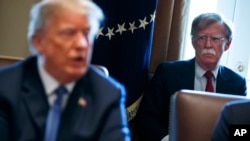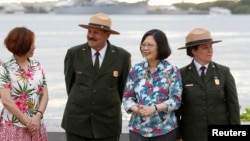An upswing in informal relations with the United States helps isolated Taiwan offset the attrition in formal diplomatic alliances at the hands of an angry China but comes with its own risks, experts say.
The number of countries that recognize Taiwan diplomatically fell to 19 Tuesday after the government severed ties with the Dominican Republic. The Caribbean nation allied with Taiwan for 77 years switched recognition to China. It was the third switch by a Taiwan ally to China since 2016.
China sees Taiwan as part of its territory rather than a state entitled to diplomacy. It insists that the two sides eventually unify despite polls showing Taiwanese prefer autonomy. Taiwan’s ruling party rejects the Chinese idea of unification, and Taiwan’s government says China pays Taiwanese allies to switch allegiance.
A congressional bill in Washington to promote high-level visits with Taiwan, a U.S. agreement to free up submarine technology for Taiwan and U.S. President Donald Trump’s pick of John Bolton, a staunch Taiwan backer, as national security adviser have brought Taipei closer to Washington this year.
“Because these formal friends are gone, the number of formal diplomatic allies gets to be fewer and you’d have relatively little so-called formal support, bit by bit you would need the United States to give you a voice,” said Gratiana Jung, senior political researcher with the Yuanta-Polaris Research Institute think tank in Taipei.
But “totally to rely on favors from the United States has a definite risk,” she added.
Taiwan-U.S. relations on a roll
Taiwan looks to its remaining formal allies, small and mostly poor countries, for a voice in international organizations, such as the United Nations. Keeping formal alliances abroad also helps Taiwan’s government argue, despite China, that it’s a country.
China’s more than 170 allies, including the world’s most powerful nations, now block Taiwan from participating in U.N. agencies on grounds that it lacks statehood.
Washington, though one of the countries that recognize China, has long been a staunch informal backer of Taiwan as a fellow democracy aligned with formal U.S. military allies such as Japan and the Philippines.
Confirming that relationship, Trump signed the Taiwan Travel Act in March to encourage visits both ways by senior government officials.
Trump’s administration agreed last month to give American defense contractors marketing licenses for selling potentially sensitive Taiwan submarine technology. The government and members of Congress also speak out sometimes on behalf of Taiwan.
After Taiwan and the Dominican Republic broke ties, a U.S. Department of State spokesperson said Washington “urges China to work to restore productive dialogue and to avoid further escalatory or destabilizing moves.”
Taiwan President Tsai Ing-wen has irritated Beijing since she took office in 2016 by rejecting Beijing’s idea that both sides belong under one flag.
“Further helping Taiwan President Tsai Ing-wen cope with Santo Domingo’s diplomatic dis is the fact that she must be feeling good about U.S. President Trump’s recent backing of Taiwan,” said Sean King, vice president of the Park Strategies consultancy in New York.
Risks and limitations
Washington is building relations with Taiwan now as part of Trump’s China policy, some experts say. China and the United States are poised for a trade war, and Trump wants China’s help in reducing any military threat from North Korea. He might “reward” China if North Korea offers what he wants, King said.
“Judging from Trump’s previous behavior, one cannot rule out the possibility he has just raised the ante to get more economic benefits from Beijing, and Taiwan is a pawn in this game,” said Lin Chong-pin, a retired strategic studies professor in Taiwan.
If a new president replaces Trump after elections in 2020, the next U.S. government might sideline Taiwan to work more closely with China, experts say.
“If Taiwan has only the United States as its official unofficial diplomatic partner, then Taiwan will subject itself to the fluctuation of the U.S. domestic politics and U.S. policy toward China on this issue, and I think it does increase Taiwan’s vulnerability,” said Yun Sun, East Asia Program senior associate at the Stimson Center think tank in Washington.
The United States even as a staunch informal friend of Taiwan cannot give Taiwan the status it gets internationally from diplomatic partners, Sun said.
Unless Taiwan warms up to Beijing, China may keep picking off the formal allies, she said. Taiwan would then risk becoming a “second-class player” with murky international status, she said.
But if Taiwan’s formal allies keep switching to China, the government in Taipei must look more to other countries for help, King said.
“There’s always the risk to Taiwan of getting caught putting all its eggs in its American … basket, but the island really has nowhere else to go,” he said.






